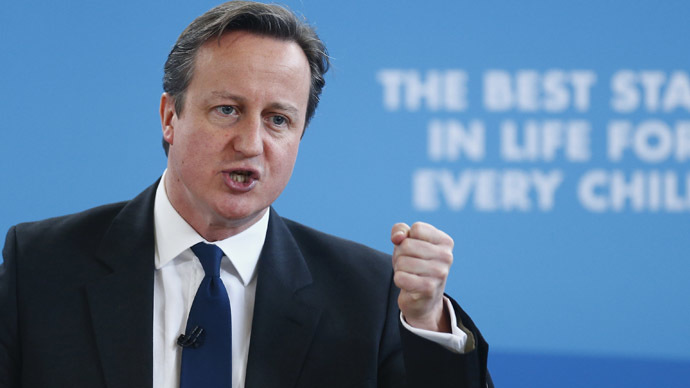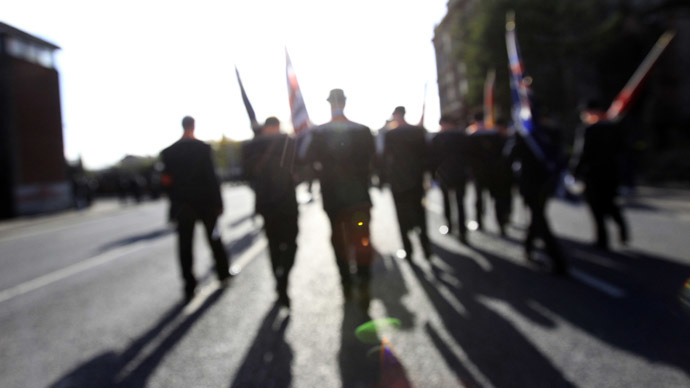Britain couldn't defeat its own separatists, so why is Kiev asking for London's help?

Ukraine asking the United Kingdom for advice on fighting separatists is akin to questioning the Marlboro Man about how to prevent cancer. It’s not only futile - it makes both Kiev and London look stupid.
Apparently the day Henry Kissinger won the Noble Peace Prize, satire died. If any semblance of irony had survived that curious prize-giving, it finally made a quick exit, stage left this week. Ukraine asked Britain for guidance in its struggle against rebels. Next they’ll be asking Bernie Madoff for advice on investments.
Yes, this is the same United Kingdom that spent 30 years fighting pro-Irish separatists on its own soil and eventually shared in a glorious stalemate. Over 1,000 British government personnel and almost 2,000 civilians died before London finally ordered its military forces back to the 'mainland.' Not to mention that the UK also endured billions of pounds of economic damage and a serious diminution of any residual moral authority it had aspired to project.
In 1968, when ‘The Ulster Troubles’ kicked off, ethnic Irish residents of the province were discriminated against in access to both housing and employment. To make things worse, only householders were permitted to vote - not that it mattered because of constituency gerrymandering to ensure pro-British majorities. Additionally, the police (RUC) were almost 100% ethnic British and the Special Powers Act allowed them to terrorize the minority community.
Following 30 years of British state-sponsored violence, blithesomely encouraged by numerous incumbents of Downing Street, London finally gave up in the 90’s. John Major began the negotiation of a settlement with the IRA’s political wing, Sinn Fein, and his successor, Tony Blair, was forced to accept radically different terms from those of 1968. Now, pro-Irish separatists and pro-British unionists share power, the re-branded PSNI (police) is balanced along ethnic lines and discrimination is, mostly, a thing of the past.
Ukraine is currently soliciting help and advice from the UK in its own struggle against separatists. How much Kiev knows about the circumstances in Ulster is unclear. My guess is very little.
After decades of refusal to talk to ‘terrorists,’ Britain was forced to, eventually, not only negotiate with but fully recognize rebel leaders as legitimate; now they are part of Ulster's government. This is something Kiev’s embattled President Poroshenko will not countenance for the leaders of Donetsk and Lugansk’s self-declared ‘republics.’ Unless Poroshenko is about to conduct a massive volte-face, he might as well be taking body-building lessons with Woody Allen as listening to exhortations from London.
For its part, Downing Street seems to be upset at widespread observations about Britain’s latter-day geopolitical weakness and irrelevance. After Germany and France took the lead in seeking a negotiated settlement of Ukraine’s Civil War, PM David Cameron was roundly filleted for not tagging along. Of course, Angela Merkel neither wanted nor needed him there.
But, in the UK media's Goldfish bowl, that’s beside the point. There’s a UK election shortly and Cameron is afraid to appear weak and unimportant. Never mind that he is feeble and irrelevant, he can’t afford to let the British public realize that Germany, France and Russia are the principal powers of modern Europe and the UK is about as significant as Italy.

The last time Britain was a serious geopolitical player was during the halcyon days of Margaret Thatcher’s lengthy rule. Ronald Reagan needed a dependable European ally in his quest to weaken the USSR. West Germany, with ‘ostpolitik’ all the rage, was unreliable and Mitterrand’s France was too socialist itself. Association with Reagan's star power boosted Thatcher, and her nation shared in the warm glow. Since then it’s all been downhill.
However, news has yet to reach London’s self-absorbed and jingoistic press.
They believe Britain still matters. Sorry chaps, it doesn’t. Washington has essentially outsourced Europe to German management and Russia regards Britain as an irrelevant little island. Meanwhile, China hardly gives a flying feng shui.
In military terms, both France and Russia would each annihilate the UK’s weakened conventional forces if necessary. We are now a long way from the military might of an empire which once dominated the globe.
If post-war British diplomacy hit a high water-mark under Thatcher, it has plummeted to a nadir under Cameron. His inconsistent, frankly bonkers, foreign policy has destroyed relations with the EU, rendering the UK impotent in Brussels. The old Etonian’s scattergun approach had made him look stupid on Syria, when his own parliament over-ruled his rush to war. In Libya, Cameron’s hunger for regime change has left only chaos behind. Initial false optimism replaced by a ‘mobocracy’ as a once stable nation buckles.
Also, the PM’s statements on Iran seemed to be more about selling Typhoon jets, thus bolstering Britain’s struggling armaments industry, than anything approaching reality.
The legend of Midas suggests that the Greek king could convert any object to gold just by touching it. Cameron seems more proficient in transforming utopian notions into washouts. This is the man who, through sheer ineptitude, almost destroyed a centuries old union between England and Scotland. Indeed, the final act in his political life will probably be to lose the forthcoming election to a Labour/Scots Nationalist coalition.
Europe is tired of Ukraine. That’s what Minsk was really about, Core Europe (led by Germany and France) signaling to Kiev that there’s no support for continuing the civil war. Only a few fringe countries - Estonia, Lithuania and Poland - still exhibit any hunger for continued bloodshed. In a fit of petulance, after being shunned by the real powers, Cameron has allied the UK with peripheral EU countries which have historic grievances with Russia. He’s finally found a way to scrape the bottom of the barrel.
For its part, Kiev is now being advised by a country which, despite far greater resources, was unable to defeat a small separatist army on its own territory. In a mirror of Russian support for the rebels, the IRA was heavily funded and armed by sympathetic Americans. However, as with Russia in east Ukraine, this didn’t extend to official US military support.
Twelve months since its self-destructive Maidan coup, Ukraine has shed large swathes of its territory and forever lost the hearts of minds of much of its populace. It took the UK 30 years to realize its Ulster policy would never succeed. The best thing the 75 British military advisers about to be deployed to Ukraine can do is explain that to their counterparts. It would save thousands of lives.
Peace is hard to achieve on the ground and peace is tough to sell to radical nationalists. However, one suspects that peace is not what Kiev and London are thinking of.
MORE:
The statements, views and opinions expressed in this column are solely those of the author and do not necessarily represent those of RT.
The statements, views and opinions expressed in this column are solely those of the author and do not necessarily represent those of RT.













